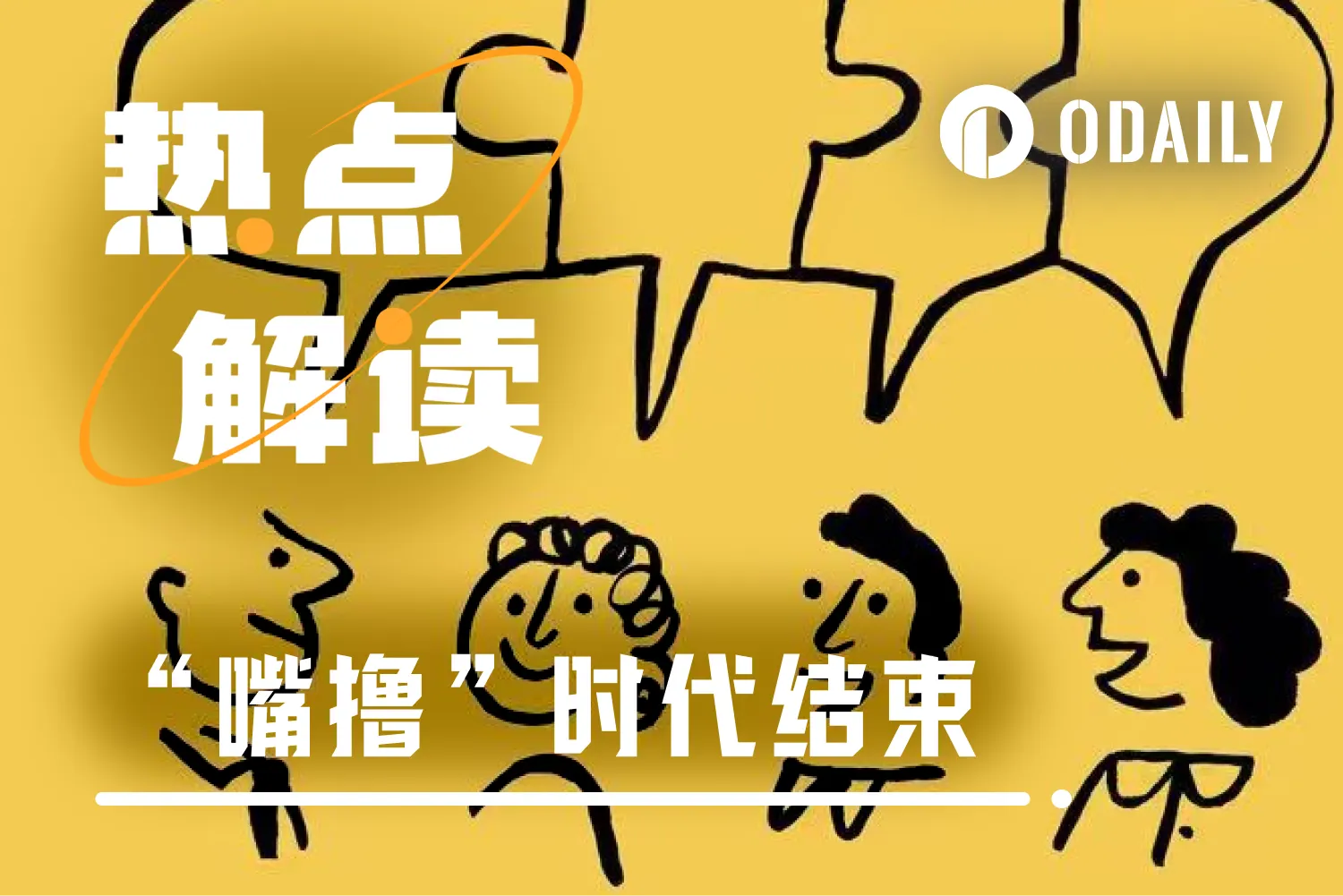เหตุใดการประกาศอย่างเป็นทางการโดย LayerZero จึงทำให้เกิดความไม่พอใจต่อสาธารณะในชุมชน Lido
ต้นฉบับ - โอเดลี่
ผู้เขียน - อาซึมะ
เมื่อวันที่ 26 ตุลาคม LayerZero โปรโตคอลการทำงานร่วมกันข้ามสายโซ่ได้ประกาศบน Avalanche, BNB Chain และ Scroll อย่างเป็นทางการเพื่อโอนโทเค็นได้อย่างอิสระ
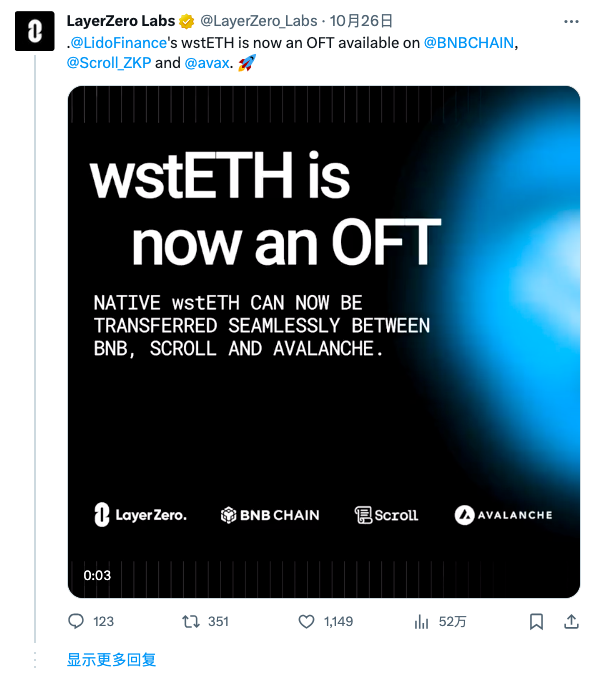
หลังจากการประกาศ ฝ่ายต่างๆ ที่เกี่ยวข้องกับเหตุการณ์ดังกล่าว เช่น Avalanche และ BNB Chain ติดตามพร้อม แสดงความยินดี บนโซเชียลมีเดียดูเหมือนว่านี่เป็นความร่วมมืออย่างเป็นทางการระหว่างโปรโตคอลชั้นนำ และดูเหมือนว่า Lido ต้องการใช้ LayerZero เพื่อขยายไปสู่ระบบนิเวศใหม่มากขึ้น
อย่างไรก็ตาม เมื่อเวลาผ่านไป สิ่งต่างๆ ก็เริ่มพัฒนาไปในทิศทางที่ไม่คาดคิด บุคคลแรกที่เสนอความคิดเห็นที่แตกต่างกันคือภายในชุมชนลิโดมากมายสมาชิกชุมชนเน้นย้ำบนโซเชียลมีเดียว่าการใช้งาน LayerZero นี้ไม่ได้รับการยอมรับจาก Lido DAO และระบุว่า OFT wstETH ซึ่งได้รับการรับรองโดยข้อตกลงของบุคคลที่สาม (LayerZero) จะถูกนำมาใช้เป็นเวอร์ชัน อย่างเป็นทางการ ของหลาย ๆ รายการที่ได้รับความนิยม ระบบนิเวศที่มีสถาปัตยกรรมต่างกัน การออกแบบ และกระบวนการก้าวหน้ายังไม่สมเหตุสมผลเพียงพอ
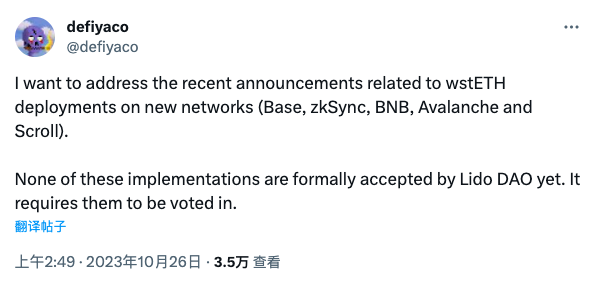 คำถามระดับแรก: ปัญหาด้านความปลอดภัยของโมเดล OFT เอง
คำถามระดับแรก: ปัญหาด้านความปลอดภัยของโมเดล OFT เอง
การตั้งคำถามระดับแรกมุ่งเน้นไปที่ประเด็นด้านความปลอดภัยของโมเดล OFT เอง
สมาชิกชุมชน @arixoneth เชื่อว่านอกเหนือจากเลเยอร์ 1 เช่น Avalanche และ BNB Chain แล้ว Scroll ซึ่งเป็นเครือข่ายเลเยอร์ 2 ที่มีสถาปัตยกรรม zk-Rollup วิธีที่ปลอดภัยที่สุดในการแนะนำสินทรัพย์ mainnet ควรใช้ Rollup Native Bridge แทนการใช้สะพานที่สาม ชั้น โปรโตคอลการเชื่อมโยงสามฝ่าย การแลกเปลี่ยนการเสียสละหลักทรัพย์เพื่อแลกกับสภาพคล่องจำนวนหนึ่งนั้นไม่คุ้มค่า
สมาชิกชุมชน @hal2001 กล่าวว่าโมเดล OFT ใช้สถาปัตยกรรม mint/destroy ตามสัญญาอัจฉริยะที่ได้รับอนุญาต ซึ่งหมายความว่าอาจมีช่องโหว่ที่อาจเกิดขึ้นซึ่งนำไปสู่การสร้าง wstETH แบบไม่จำกัดโดยไม่ได้รับอนุญาตเมื่อพิจารณาถึงความสำคัญของ wstETH ต่อระบบนิเวศ Ethereum หากโมเดลถูกทำลายและมีการสร้าง wstETH จำนวนมากอย่างผิดพลาด สิ่งนี้สามารถกระตุ้นให้เกิดการไถ่ถอนและการขาย ETH จำนวนมากได้อย่างง่ายดาย ซึ่งจะเป็นการทำลายรากฐานทางนิเวศวิทยา
Hart Lambur ผู้ก่อตั้งโปรโตคอลการทำงานร่วมกันแบบกระจายอำนาจ Across Protocol ยังโพสต์บนแพลตฟอร์ม X ว่า “ในช่วงกลางเดือนกันยายน ฉันวิพากษ์วิจารณ์การตัดสินใจของ LayerZero ในการใช้ oracle แบบรวมศูนย์ของ Google เป็นตัวเลือกเริ่มต้น โดยเฉพาะอย่างยิ่งเมื่อพวกเขายังคงเลื่อนระดับเป็น กระจายอำนาจเมื่อเร็วๆ นี้ สมาชิกหลายคนในชุมชน Lido รู้สึกไม่พอใจเมื่อ LayerZero ใช้ Google oracle แบบรวมศูนย์เดียวกันอีกครั้งเพื่อปรับใช้สะพาน wstETH ที่ไม่ได้รับอนุญาต โดยทำการตลาดเป็นเวอร์ชัน อย่างเป็นทางการ (กระจายอำนาจ)LayerZero มีประวัติในการทำการตลาดผลิตภัณฑ์ของตนในลักษณะที่มีชื่อเสียง แต่ไม่เต็มใจที่จะหารือเกี่ยวกับรายละเอียดทางเทคนิคและข้อควรพิจารณาเบื้องหลัง สิ่งนี้ไม่ดีต่ออุตสาหกรรมของเรา และฉันก็เบื่อกับพฤติกรรมนี้แล้ว
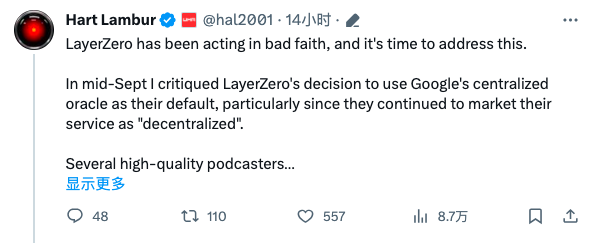
โดยรวมแล้ว สมาชิกชุมชนจำนวนมากได้แจ้งข้อกังวลด้านความปลอดภัยเกี่ยวกับโมเดล OFT และเน้นย้ำว่าทั้งผู้สนับสนุน Lido DAO และผู้เชี่ยวชาญด้านความปลอดภัยภายนอกไม่ได้ดำเนินการประเมินความปลอดภัยของโซลูชันของ LayerZero อย่างละเอียด รวมถึงการวิเคราะห์ทางสถาปัตยกรรมและผลกระทบต่อโปรโตคอลหลัก และการทบทวนสิ่งประดิษฐ์ในการใช้งานและกลไกการกำกับดูแล และอื่นๆ
การตั้งคำถามระดับที่สอง: ข้อผิดพลาดของขั้นตอนในการส่งเสริมการกำกับดูแล
นอกเหนือจากการออกแบบแผนแล้ว ความสงสัยมากขึ้นในชุมชนมุ่งเน้นไปที่ข้อผิดพลาดขั้นตอนของ LayerZero ในความก้าวหน้าด้านการกำกับดูแล
ตามขั้นตอนการกำกับดูแลตามปกติผู้ริเริ่มข้อเสนอควรเลื่อนการใช้งานหลังจากที่เนื้อหาข้อเสนอได้รับการพูดคุยและยอมรับโดยชุมชนอย่างสมบูรณ์ อย่างไรก็ตาม คราวนี้ LayerZero ประกาศอย่างเป็นทางการ ว่าได้เปิดตัว OFT wstETH ทันทีหลังจากเริ่มข้อเสนอ และเข้าร่วม จับมือกับ Avalanche, BNB Chain และสื่อบางส่วนสร้างแคมเปญที่มีชื่อเสียงสูง การดำเนินการนี้ถูกสงสัยว่าใช้การประชาสัมพันธ์เพื่อลักพาตัวธรรมาภิบาลชุมชน
สมาชิกชุมชน @hal2001 เชื่อว่า LayerZero, Avalanche และ BNB Chain ดูเหมือนจะบรรลุข้อตกลงด้านการตลาดของงานนี้โดยมีเป้าหมายเพื่อทำให้ชุมชนคิดว่า Lido DAO ได้ยอมรับมาตรฐาน OFT อย่างเป็นทางการแล้ว อย่างไรก็ตาม ไม่เป็นเช่นนั้น นี่เป็นเพียงข้อเสนอเบื้องต้นเท่านั้น
ที่ปรึกษาเชิงกลยุทธ์ของ Lido @Hasu กล่าวว่าเขา พูดไม่ออก ขั้นแรกเขาปรับใช้เพียงฝ่ายเดียว จากนั้นจึงทำการตลาดผ่านช่องทางอย่างเป็นทางการ รู้สึกเหมือนเป็นการบังคับให้ Lido DAO ยอมรับข้อเสนอ แม้ว่าจะไม่มีอะไรผิดปกติกับโซลูชันของ LayerZero แต่ก็ยังต้องมีการพูดคุยกันอย่างเต็มที่ภายในชุมชน และอนุญาตให้ชุมชนเลือกจากโซลูชันที่หลากหลาย มีข้อผิดพลาดในการลำดับความก้าวหน้าของเรื่องนี้
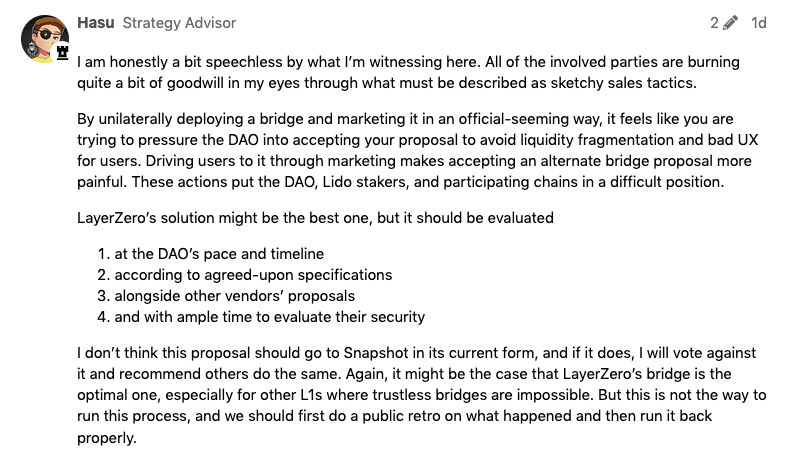
สมาชิกชุมชน @Scaloneta ยัง แสดงความโกรธ เช่นกันว่าการประกาศอย่างเป็นทางการเกี่ยวกับบางสิ่งที่ไม่ได้รับการโหวต ราวกับว่ามันกลายเป็นความจริง ถือเป็นการไม่เคารพ Lido DAO และยังแสดงให้เห็นว่า LayerZero เองก็ไม่ได้จริงจังเพียงพอ
การตอบโต้โดยรวมโดยเพื่อนและนักธุรกิจ
ในขณะที่ชุมชน Lido ระดมยิง LayerZero ร่วมกัน โปรโตคอลข้ามสายโซ่หลัก ๆ ก็ไม่ได้ใช้งานเช่นกัน เมื่อเห็น LayerZero แย่งส่วนแบ่งตลาดด้วยการปฏิบัติที่ผิดจรรยาบรรณดังกล่าว พวกเขาจะไม่นั่งเฉยๆ และรอความตายโดยธรรมชาติ
นอกจาก Hart Lambur ผู้ก่อตั้ง Across Protocol ที่กล่าวถึงข้างต้น คนแรกที่ริเริ่มคือ Georgios Vlachos ผู้ร่วมก่อตั้ง Axelar Network เขาเสนอแผนการแข่งขันที่กำหนดโดย Axelar Network ภายใต้หัวข้อสนทนาข้อเสนอของ LayerZero และได้รับการสนับสนุนแล้ว จากสมาชิกชุมชนบางส่วน
 ต่อมา Michael Robinson ผู้จัดการฝ่ายการตลาดผลิตภัณฑ์ของ Chainlink Labs ยังได้เสนอโซลูชันที่แข่งขันได้โดยใช้โปรโตคอล CCIP ที่สามารถทำงานร่วมกันข้ามสายโซ่ได้
ต่อมา Michael Robinson ผู้จัดการฝ่ายการตลาดผลิตภัณฑ์ของ Chainlink Labs ยังได้เสนอโซลูชันที่แข่งขันได้โดยใช้โปรโตคอล CCIP ที่สามารถทำงานร่วมกันข้ามสายโซ่ได้
ในช่วงเช้าตรู่ของเช้านี้ โครงการสำคัญ 8 โครงการ ได้แก่ Connext Network, ChainSafe, Sygma, Li.Fi, Socket, Across Protocol, Celer และ Router ได้ร่วมกันออกเอกสาร โดยวิพากษ์วิจารณ์ LayerZero อย่างโกรธเคืองว่า ไม่ปฏิบัติตามจรรยาบรรณการต่อสู้ และเรียกร้องให้ การจัดตั้งมาตรฐานการเชื่อมโยงข้ามสายโซ่แบบเปิด
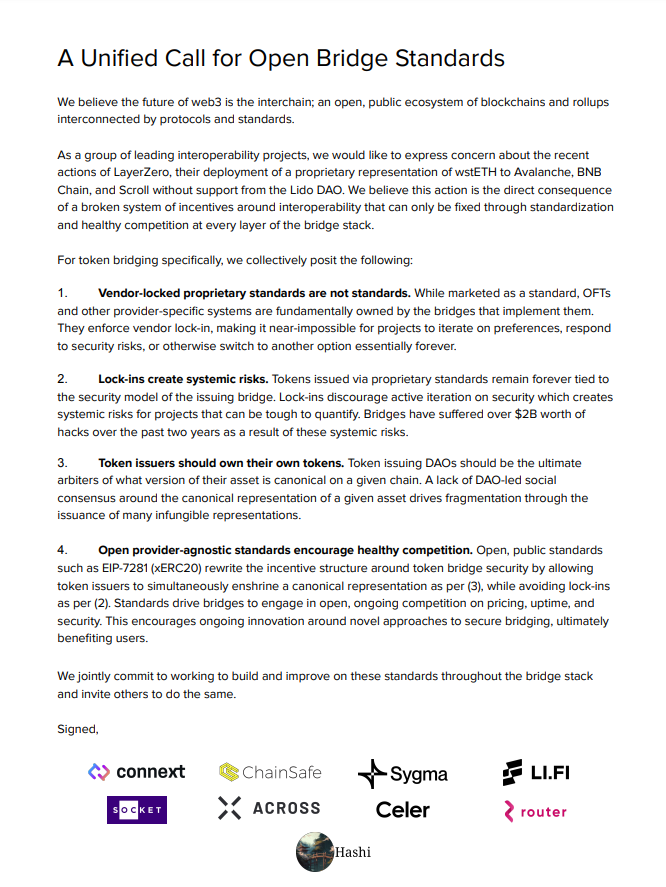
ความยืดหยุ่นแบบกระจายอำนาจ
โดยรวมแล้ว LayerZero เอาชนะตัวเองได้ในครั้งนี้ และท้ายที่สุดก็ก่อให้เกิดความโกรธเคืองโดยรวมของชุมชน Lido และเพื่อนในอุตสาหกรรม
จากการตีพิมพ์บทความ คำตอบล่าสุดของ LayerZero เกี่ยวกับเรื่องนี้คือ: ประการแรก เห็นด้วยกับชุมชนว่า Rollup Native Bridge มีความปลอดภัยมากกว่า และยินดีที่จะยกเลิกการรองรับการเชื่อมโยงสำหรับ Scroll ประการที่สอง ยินดีที่จะส่งมอบ การเป็นเจ้าของ Avalanche และ BNB Chain Bridge ทำสัญญากับ Lido DAO ทำให้ DAO สามารถควบคุมการกำหนดค่าต่างๆ ได้
เมื่อมองย้อนกลับไปที่เหตุการณ์ทั้งหมด แม้ว่าพฤติกรรมของ LayerZero จะเพียงพอที่จะ จับม้า ได้จริงๆ แต่เรารู้สึกประทับใจกับประสิทธิภาพภายในของ Lido DAO ในเหตุการณ์นี้มากยิ่งขึ้น แม้ว่า LayerZero จะกล่าวถึงในการตอบกลับล่าสุดว่าได้หารือเกี่ยวกับวิธีแก้ปัญหากับทีมหลักของ Lido ในช่วงไม่กี่เดือนที่ผ่านมา จะเห็นได้ว่าชุมชนไม่สนใจว่าคุณจะยอมรับ คำสั่ง หรือไม่ และสมาชิกในชุมชนจำนวนมากขึ้นยังคงมุ่งความสนใจไปที่พวกเขา ทั้งในโปรแกรมและตัวโปรแกรมเองด้วย
บางทีนี่อาจเป็นจุดที่ความยืดหยุ่นของการกระจายอำนาจอยู่


